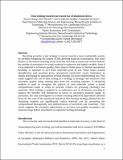Data Mining Toward Increased Use of Aluminum Dross
Author(s)
Chang, Jiyoun Christina; Olivetti, Elsa A.; Fjeldbo, Snorre Kjørstad; Kirchain, Randolph E.
Download40831_2014_3_ReferencePDF.pdf (1.247Mb)
OPEN_ACCESS_POLICY
Open Access Policy
Creative Commons Attribution-Noncommercial-Share Alike
Terms of use
Metadata
Show full item recordAbstract
Recycling provides a key strategy to move toward a more sustainable society by partially mitigating the impact of fast-growing material consumption. One main barrier to increased recycling arises from the fact that in many real world contexts, the quality of secondary (or scrap) material is unknown and highly variable. Even if scrap material is of known quality, there may be finite space or limited operational flexibility to separate or sort these materials prior to use. These issues around identification and grouping given the operational constraints create limitations to simply developing an appropriate sorting strategy, let alone implementing one. This study suggests the use of data mining as a strategy to manage raw materials with uncertain quality using existing data from the recycling industry. A clustering analysis is used to recognize the pattern of raw materials across a broad compositional range in order to provide criteria for grouping (binning) raw materials. This strategy is applied to an industrial case of aluminum recycling to explore the benefits and limitations in terms of secondary material usage. In particular, the case investigated is around recycling industrial byproducts (termed dross for the case of the aluminum industry). The binning strategy obtained by the clustering analysis can significantly reduce material cost by increasing the compositional homogeneity and distinctiveness of uncertain raw materials. This result suggests the potential opportunity to increase low-quality secondary raw material usage before investment in expensive sorting technology.
Date issued
2015-01Department
Massachusetts Institute of Technology. Department of Materials Science and Engineering; Massachusetts Institute of Technology. Engineering Systems DivisionJournal
Journal of Sustainable Metallurgy
Publisher
Springer International Publishing
Citation
Chang, Jiyoun, Elsa Olivetti, Snorre Kjørstad Fjeldbo, and Randolph Kirchain. "Data Mining Toward Increased Use of Aluminum Dross." Journal of Sustainable Metallurgy, March 2015, Volume 1, Issue 1, pp 53–64.
Version: Author's final manuscript
ISSN
2199-3823
2199-3831